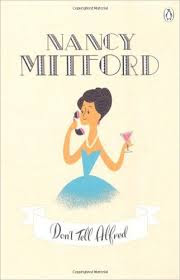
This book is a reminder to me not to get sour in my old age. The story has nothing to do with old age, but it’s still the lesson I take: it’s more about the author than it is about her book. I expected to enjoy this novel, as it’s the third in a trilogy, and I have read and re-read the first two THE PURSUIT OF LOVE and LOVE IN A COLD CLIMATE may times. They’re fatnastic, fun, clever books, great for reading when you can’t sleep, and I re-open them often.
I should have been wary of the fact that DON’T TELL ALFRED is not typically sold with the other two. The publishers clearly know that something’s not quite right. In this book the satire has become cruel, and the laughter unkind. The first books are set in the upper class English world Mitford grew up in, in 1920s Britain and are a charming account of a world that’s long gone. This latter book, written decades after the first two, is set in the 1960s, and Mitford is clearly not able to accept what she’s lost. She talks a great deal about the modern world, from eastern religion to rock ‘n’ roll, and comes across as nothing so much as bitter. Here she is on her son speaking: “Basil went on in this curious idiom, which consisted in superimposing, whenever he remembered to do so, cockney or American slang on the ordinary speech of an educated person.”
There’s lots of other humourless stuff like this, on Buddhism being obviously ‘bunkum’, and so on. All a bit much from a woman who accepted as a charming eccentricity her uncle’s love of the ‘child hunt’ (that is: when the foxes were not available for hunting, he’d use her and her cousins as prey, and chase them across the fields with dogs). Sorry Ms Mitford. It’s not such a big deal after all; there’s still the other two, and they’re fantastic, some of my favourite night time companions.
